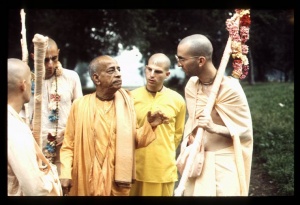SB 10.86.15

A.C. Bhaktivedanta Swami Prabhupada
TEXT 15
yātrā-mātraṁ tv ahar ahar
daivād upanamaty uta
nādhikaṁ tāvatā tuṣṭaḥ
kriyā cakre yathocitāḥ
SYNONYMS
yātrā-mātram—bare maintenance; tu—and; ahaḥ ahaḥ—day after day; daivāt—due to his fate; upanamati—came to him; uta—indeed; na adhikam—no more; tāvatā—with that much; tuṣṭaḥ—satisfied; kriyāḥ—duties; cakre—he did; yathā—as; ucitāḥ—appropriate.
TRANSLATION
By the will of Providence he obtained each day just what he needed for his maintenance, and no more. Satisfied with this much, he properly executed his religious duties.
PURPORT
An ideal Vaiṣṇava brāhmaṇa, even if encumbered by the ties of family life, should work only as hard as required to meet his obligations. Without being unnecessarily agitated for material advancement, he should devote the best part of his time and assets to his higher duties in the Supreme Lord's service. If a householder can succeed in this program despite the unavoidable difficulties of this degraded age, he can expect Lord Kṛṣṇa's personal attention, as will be seen in the case of Śrutadeva, the perfect brāhmaṇa of Mithilā.